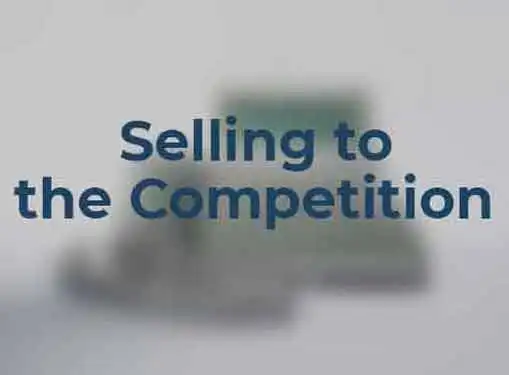How to Sell a Business
Selling to Competitors
Competitors are great potential buyers when selling your business, but how do you make sure they're serious and not just wasting your time?
Locating a buyer can be the most stressful part of selling a business.

But if you could identify a buyer without having to go through the listing process, you could sidestep the frustration of waiting for a call from your broker. Although they may not be the buyer you had in mind, a competitor might be perfect candidate to buy your business.
You might be surprised to learn that selling to a competitor is actually a common practice among small businesses. If you can get past the initial awkwardness of handing the keys over to a company you have worked hard to outperform, you will find that selling your business to the competition can eliminate the hassle of trying to keep the place afloat while you covertly scour the market for a buyer. In certain instances, sellers can even realize a higher sales price than if they sold the business to another buyer.
The reasons why competitors might be interested in your company are obvious. Less competition translates into higher sales and earnings. Additionally, the purchased company can dramatically increase a competitor's assets, value, and client base.
Selling Piecemeal
Business sales to competitors are sometimes structured differently than sales to other buyers. It's possible that the competitor's interest is limited to making sure your business no longer operates in a given territory. They could buy the entire business and sell off the assets themselves, or simply buy business rights and leave the disposition of all the assets to the seller.
However, it's more common for competitors to "cherry pick" certain assets (e.g. equipment) and exclude others (e.g. real estate). Either way, be prepared to sell your business piecemeal if the deal demands it. The upside is that you can potentially earn more by selling the company in pieces than if you sold it as a whole. But if you harbor any plans to use the excluded assets to open a similar business under a different name, forget about it. A non-compete clause will definitely be a contingency at closing.
Planning & Relationship-building
The key to selling to a competitor is advance planning in the form of relationship-building. Competitors could use the information of the sale itself to steal clients or wreak havoc on your relationships both inside and outside of your company. They could also gain access to your financial records during the buying process and leverage the information they gather.
But by building relationships with your competitors, you can get a feel for who you can and can't trust with sensitive information. You can also gain a sense of which competitors may be serious buyers when it's time to sell. Depending on the level of your relationships, it's even possible that the door could be opened for a frank discussion of a planned acquisition at some point in the future.
If you lack relationships with your competitors, it's best to engage the services of a third-party contact, preferably a professional broker, who has experience in assessing the interest and motives of competitors.
Share this article
Additional Resources for Entrepreneurs




Conversation Board
Is selling to competitors a wise move or is it a big mistake? Give your opinion below.